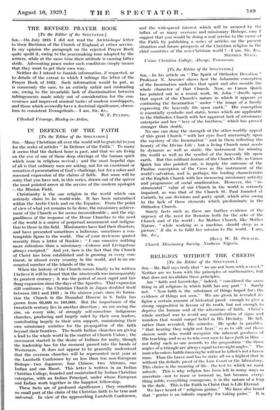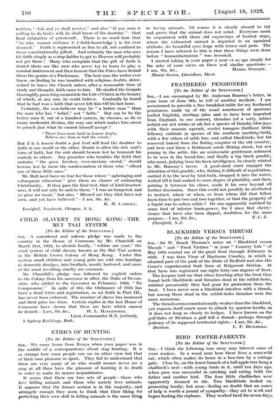RELIGION WITHOUT THE CREEDS
[To the Editor of the SPECTATOR.]
SIR,—Mr. Ball says truly that " we are not born with a creed." Neither are we born with the principles of mathematics, but that does not invalidate these principles.
Are "faith and knowledge," indeed, "considered the sainc thing in all religions in which faith has any part " ? Surely not. "Now faith is the substance of things hoped for ; the evidence of things not seen." We are given in revealed re- ligion a certain amount of historical proof—enough to give a strong supposition in favour of its truth, but not enough to deprive the human soul of the adventure of faith. Christ's whole method was to avoid any manifestation of signs and wonders that would compel belief in His Divinity. He hid, rather than revealed, His miracles. He spoke in parables, "that hearing they might not hear," so as to sift out those sincere souls who would recognize the inherent goodness of His teaching, and so as to win over men to have faith in Him - not belief such as one accords to the proposition "time three angles of a triangle are always equal to two right angles." The man who enters battle knowing he will not be killed is not a brave man. Thus the brave soul has to stake all on a highest that is without the definite proof of the Law Court or the laboratory. This choice is the meaning of life--the test to which we must submit. This is why religion has been left in many ways so uncertain—not to tease or torment us, but because every- thing noble, everything courageous, is in the nature of a leap in the dark. This is the Faith in Christ that is Life Eternal.
We have heard of "religious genius." We have also heard that "genius is an infinite capacity for taking pains." It is written, "Ask and ye shall receive," and also "If any man is willing to do God's will, he shall know of the doctrine "—that final refutation of priestcraft. There is no word here that "he who cannot embrace it (` faith-knowledge ') is for ever doomed." Faith is represented as free to all, not confined to those constitutionally gifted. And certainly the man who uses his faith simply as a step-ladder to get to Heaven will probably not get there ! Many who complain that the gift of faith is denied them are like men who never try to learn to play a musical instrument and then lament that the Fates have denied them the genius of a Pachmann. The best man the writer ever knew, on finding he was troubled with religious doubts, deter- mined to leave the Church unless, after a reasonable time of study and thought, faith came to him. He studied the Gospels thoroughly,preaching meanwhile the Life of Christi n the beauty of which, at any rate, he could believe. Gradually he found that he had won a faith that never left him till his last hour.
Certainly, the non-believer may be "a better man" than the man who has "belief," not "faith." But can he be the better man if, out of a hundred careers, he chooses, as do so many modernist divines, the very one which makes him swear to preach just what he cannot himself accept ?
"There lives mare faith in honest doubt, Believe me, than in half the creeds."
But if it is honest doubt a just God will lead the doubter to faith in one world or the other. Doubt is often the sick soul's form of faith, but the sick should beware lest he transmit his malady to others. Any preacher who troubles the faith that sustains "the poor, loveless, ever-anxious crowd," should beware lest he incur the condemnation of those who offend one of these little ones."
Mr. Ball need have no fear for those whose " upbringing and slbsequent education" give them no chance of embracing Christianity. If they pass the final test, that of kind-hearted- ness, it will not only be said to them, "I was an hungered, and ye gave me meat," but also, "Blessed are they that have not seen, and yet have believed.--I am, Sir, &c.

































 Previous page
Previous page